Further support
There are a range of different professionals and services you can talk to or gain further support from.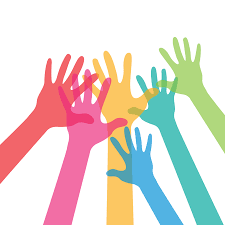
You can:
- Contact your GP - if you don't have one, use the NHS's find a GP service.
- Contact your school pastoral lead or school nurse
- Get help from NHS 111.
- ChatHealth to text the school nursing service for advice: 07507 327104 (Derby city), 07507 330025 (Derbyshire)
- Childline: 0800 1111
- Derbyshire Mental Health Helpline and Support Service: 0800 0280077
- Breakout – the young person’s drug and alcohol service for Derby city: 01332 641661 or email dmh-tr.childfamily-derby@nhs.net
- Young People's Service - the young person's drug and alcohol service for Derbyshire county: 01773 303646 or email derbyshire@cgl.org.uk.
There is also advice if you're feeling in crisis here on the Derbyshire Healthcare NHS Foundation Trust website.
on the Derbyshire Healthcare NHS Foundation Trust website.
Plus, the Derby and Derbyshire emotional health and wellbeing website has information about other local organisations that can help you.
Further information
Please find some further information on different topics to help you get a basic understanding of them and how you may support yourself and others.
What is mental health?
Mental health includes our emotional, psychological, and social wellbeing. Just like physical health everyone has mental health.
Mental health is important through every stage of your life, from childhood to adolescence through to adulthood.
Types of mental health disorders:
- Anxiety
- Bipolar disorder
- Body dysmorphic disorder (BDD)
- Borderline personality disorder (BPD)
- Depression
- Obsessive compulsive disorder (OCD)
- Personality disorder
- Schizophrenia
If you are diagnosed or struggling with a mental health problem, remember that it doesn’t change you are as a person! You are still who you are before a diagnosis, it doesn’t define who you are!
How can mental health affect yourself?
If you or someone is struggling with their mental health, it can impact you in different ways. It can affect how we think, fell and act.
Different ways you may be struggling or some one else:
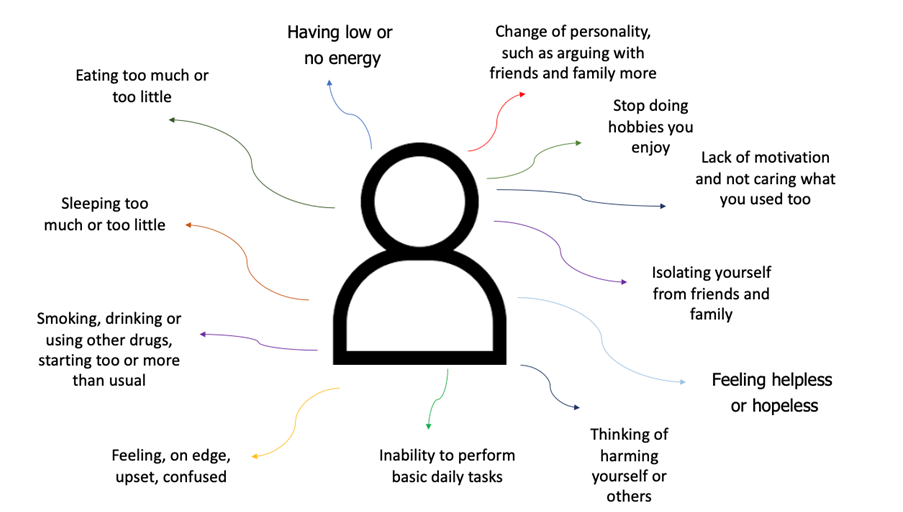
How can you support yourself/ and someone else struggling?
Talk to someone! - Reaching out to someone you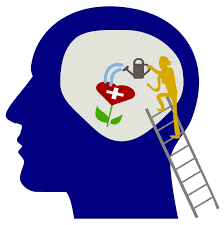 trust, or a professional is the first step. Talking to someone straight away may not help solve any problems but is the beginning. But remember you have the decision on when you’re ready to talk to someone!
trust, or a professional is the first step. Talking to someone straight away may not help solve any problems but is the beginning. But remember you have the decision on when you’re ready to talk to someone!
Take your time – When you reach out to someone, it’s a big step! Remember to take your time and go at your own pace when talking to someone. Your allowed to set your own time scale on what you’re comfortable with. Try and be honest with you speak to about what your comfortable with.
Look after yourself - It’s good to reach out to someone you trust or a professional, but it is also important to try and carry on looking after yourself. Yes this includes, eating and drinking and sleeping enough for yourself, but doing things you enjoy. For example, doing activities you like to do such as hang out with friends, listening to music, going shopping,
Physical exercise - Looking after your self and spending time with friends and family is important, but spending time outside when you can is important as well! You can go on a walk with friends and family, or with your dog if you have one! If you are sporty, try and go to your sports practices or kick or throw a ball around with your friends! Any type of physical exercise small or large is good!
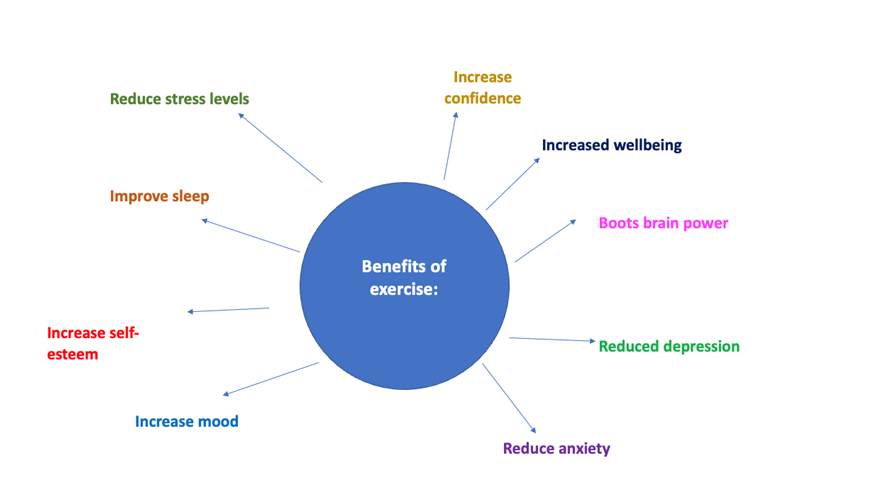
Where can you get help?
If you’re struggling with your mental health, remember just like helping other people, you need look after yourself as much as possible.
- Try to get enough sleep.
- Spend time with people such as friends and family who make you feel happy and care about
- Do things which you enjoy, such as hanging out with friends, hobbies and etc
- Relax and reduce stress, for example, spending time with people who help you feel relaxed, doing things you enjoy which takes your mind of things.
- Look after your physical health such as going on a walk
As we say to other people struggling, give yourself time to figure out what works best for you and what your comfortable with.
If someone needs more help:
We all like to be there for people we care about, friends and family but sometimes there is only so much support we can give to one person.
Remind them that this is the first step talking to or some one else they feel comfortable reaching out too.
Further places to recieve help:
- Contact your GP
- Get help from NHS 111
- Contact your school pastoral lead or school nurse
What is self-harm?
Self-harm is when someone hurts themselves as a way of dealing with hard feeling and experiences. Anybody, any age or gender can self-harm.
There are many reasons why a person may self-harm. People who self-harm, doesn’t mean that they’re suicidal. There is people who self-harm and are suicidal. Here are some examples on why someone may self-harm:
- Have a sense of being in control
- Turn thoughts or feelings into something visible
- Expressing how they are feeling what they can’t put into words
- Escape traumatic experiences or memories
- Express suicidal feeling
- Have something in their life that they can reply on
- Difficult relationships with friends or families
- Being builled, either at home, work or school
Remember these aren’t only the reasons someone may being or wanting to self-harm. Everyone have different life’s and experience different things.
How to help someone who are struggling? ( What to say and not what to say)
If it often that people want to keep self-harm a secret. This could be due to a number of different reasons: feeling ashamed if someone found out and fear of discovery.
If you notice someone is self-harming or struggling, make sure you approach them in a calm, unjudgmental attitude. It is important to reassure the person they are not alone and there is support available.
Different distraction techniques?
Understanding your or someone else’s patterns of self-harm can help you recognise the urges wanting to self-harm.
Some people who self-harm, have certain triggers which urge that person to hurt themselves. Understanding triggers can allows to see what gives yourself or someone the urge to hurt yourself. Triggers can be situations, people, specific thoughts or feelings.
If you are struggling:
It is important if you are struggling with self-harm to treat yourself how you would be helping someone else.
Distraction techniques: Trying to understand your triggers will allow you to beware of the urges. Understanding will give you more control of the situation and aware what is happening. Once known of the trigger, trying different techniques on to distract yourself.
Talk to someone: Don’t feel pressured to talk to someone until you are ready and with some one that you trust. Your feeling are valid and should be spoke in a safe and unjudgmental area. You have got to remember if you speak to someone else and they feel you are at risk they may talk to someone else about it, only for your safety.
What are suicidal feeling?
Suicide is the act of deliberately killing oneself. Suicidal feeling can mean having thoughts of feeling that people would be better off without you or thoughts about ending your life.
Someone who is suicidal may experience a range of feelings and thoughts. Remember anyone who is suicidal can experience and feel different things to someone else who is also suicidal.
Here are some examples of what some may think or feel and they may experience?
If someone tells you if they are having suicidal feeling, take them seriously. Remember you don’t have to be able to solve their problems but show them support and reassure them that it is okay to reach out for support and get the help they need. Some people who are suicidal may not be ready to tell you everything about how they are feeling and experiencing so reminding them that you are there when they are ready is very important.
Here are some examples on what you can do to support someone who is having suicidal feeling:
- Encourage them to talk about their feeling and experiencing
- Offer both emotional and practical support, by spending time with them when possible and try and do things that they enjoy doing. For example, going shopping, going to the cinema, or just hanging out together.
- Help them think of ideas for support. For example, when and if they are ready to reach out, talk to a trusted adult who can help reach out to the GP or go support them talking to someone they trust, such as a pastoral at school or collage.
- Remind them what they are feeling is valid and they don’t have to apologise for feeling what they are feeling. Some people may feel destressed when some people find out about they are feeling, so reassuring that person is important.
What is Substance Misuse?
Substance misuse is the use of substances in way that is harmful and can cause risk to your health. It can change a way a person thinks or feels and how they act.
A lot of older people may use alcohol when they go to the pub, out for meal or for a celebration or just in general. But the illegal age to buy and drink alcohol is 18. But that doesn’t mean that children under the age of 18 don’t drink alcohol or take drugs. Many young people can access these substances through family members or older friends they may have at school or in their local area.
It’s important to understand the impact drugs and alcohol can have on a person. You can access FRANK which you will be able find the different impacts of drugs have on a person:
FRANK: https://www.talktofrank.com/get-help/find-support-near-you
You can check how many units are in a alcoholic drink by looking on the label.
How can you support yourself?
Talking to someone about your problems can be very scary, difficult. Especially if its to someone that you don’t really know like a professional or even someone who is close.
If you are struggling or someone who close to you:
- Talk to someone you trust such as a parent or guardian
- Talk to your GP
- Talk to pastoral staff or a teacher at school
- Talk to services (which can be found on further resources)
Supporting others
Talking to someone who takes drugs can be a difficult conversation to have with them and for yourself if taking drugs can be hard to reach out for help.
Some things to remember when speaking to someone taking drugs:
- Talk to the person you want to talk to about what is happening in a safe private area. This could be in a quiet place at school or at home or even out going for a walk. It is important that you are in area you can feel you can open up in.
- When talking to someone, remember there is plenty of time to talk about what is happening. There is no RUSH! You’re allowed to set your own pace when talking about things.
Remember you can’t force anyone to stop doing drugs or wanting help. Its something a lot of people must decide they need to do, but you can still help them in different ways.
- Encourage the person to stay away from the places or people they may make drugs at or with
- Remind the person the potential risk factors of drugs and that there is support available when they ready for it
- Carry on being there for them, as a friend, or family member if save to do so.
Remember, talking to someone is the first step in receiving support!
If your being influenced by certain people either at school or in the community to take drugs, try and stay away from the places or people if possible or safe to do so.
What is Grooming?
 Grooming is where someone builds a relationship with children, young people and even adults so they can manipulate and abuse them. People are being groomed can be exploited, sexually abused or trafficked. Grooming can take place in person or online.
Grooming is where someone builds a relationship with children, young people and even adults so they can manipulate and abuse them. People are being groomed can be exploited, sexually abused or trafficked. Grooming can take place in person or online.
If someone is talking to someone online, they may not know, for example an older person, they build a relationship with them, telling them different things and getting them to do things.
The abuser can be close to that person. They can also be charming, kindful and the type of behaviour people value. A groomer can be anyone, no matter age, race or gender.
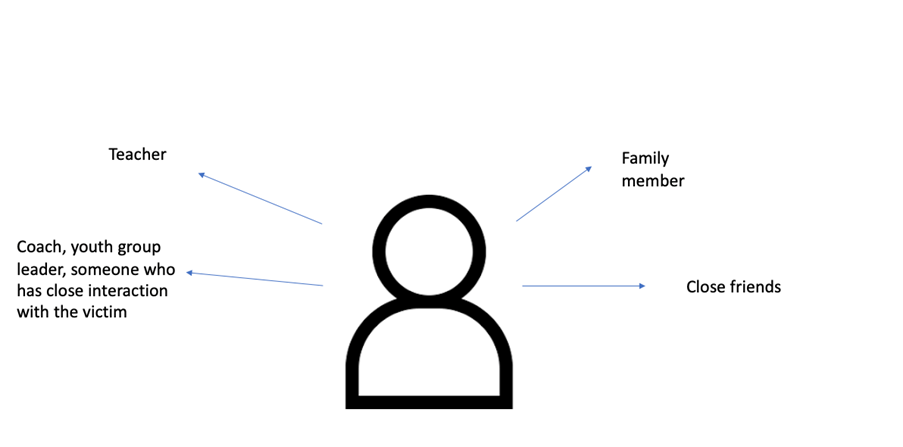
Here are some examples of a person being groomed may experience:
- The abuser may make the person not do certain things, controlling them. For example hanging out with friends, not going to certain places, like school or college or the park.
- The abuser may want the person to ‘keep secrets’ and not wanting them to tell anyone as they may not understand or will get in trouble. These secrets can be things that a person should not be experiencing or doing.
- The abuser may give gifts or special attention to someone, making them feel special. The abuser may do this also to gain the persons trust, trying to befriend them further.
Whether it’s happening online, in person or both, it’s important that you reach out for help.
How to stay safe?
Here are some signs to look out for someone may be experience grooming?
- Is your friend or someone you know spending more time or less time than usual online or on their devices? Such as their phone, laptops, tablets?
- Are they being secretive about what they doing? A person can be closed off where they are going or who they are seeing. They could be going somewhere new or seeing someone older, such as a teacher or older boyfriend or girlfriend.
- Are they drinking or taking drugs?
- Are they acting differently in using sexual language you would not expect them to know?
- Are you seeing a person with new clothes, new items in their live that they may not usually get or can’t explain?
Someone who has experience grooming, they can suffer from negative effects. It might take a while for someone to realise or accept what is happening to them. It is important to understand how someone who has experience grooming may feel:
How do you get support:
- Talk to an adult you trust. This can be a family member either your parents or legal guardian or another family member you can trust and talk too. At school or college this can be a teacher, pastorale lead or school nurse.
Social Media: How to stay safe?
A lot of people including young people and adults are on social media. This may be having an account on Facebook or snapchat for example, to keep in contact with friends or families or wanting to keep up on the latest celebrity gossip or sports news on twitter or Instagram.
When making account on social media it is important to make sure that you use the variety of privacy setting: This can include:
- Making your account private so people need an acceptance of a friend request to see your account. This means that you can be in charge of who can access your account and see what you post!
- There are settings on social media platforms such on Facebook that you can change on what people see when they search for your platform. Make sure that all your personal details are not display for your own safety and unknown people can’t contact you.
- On certain social media platforms, such as twitter, Instagram or snapchat you can make a funny username. If you don’t feel comfortable putting your name on social media, you can be creative and make up a fun username!!
- Social media platforms such as twitter, Instagram, or face book, includes profile pictures. You might want to put it as your pets or with family! If your profile picture is of yourself make sure it doesn’t include any personal details that someone may be able to contact you by, such as your school or college logo, address details such as road sign.
Things to remember when using social media:
- Your social media should be for people that you know for you to able to share and communicate what you have been up to!
- Social media is a great way to stay in contact with friends and family! Especially if they live far away or do not see them often.
- It is important to remember to be cautious online, if you receive a message from someone who you don’t know or concerns you, speak to a trusted person about it. You can also block them and decline friend requests.
What is loneliness?
Loneliness is something that everyone experiences, from children to adults. There are times in our life’s that we are alone but that is not the same as loneliness. You could have loads of relationships with people, but the needs in them aren’t being met.
something that everyone experiences, from children to adults. There are times in our life’s that we are alone but that is not the same as loneliness. You could have loads of relationships with people, but the needs in them aren’t being met.
Feeling lonely can have an negative impact on your mental health but some ones mental health can make someone feel lonely.
What causes loneliness?
Some one experiencing loneliness can have many different causes. Remember everyone is different and experience things differently.
Some life events can cause some people to be lonely:
Some people may experience loneliness due to their living circumstances and personal life.
Some people experience loneliness for a long where some people may only for a short amount of time. Everybody is different when experiencing and dealing with loneliness.
How can I manage my loneliness?
Look after yourself: Feeling lonely can have an impact on your general wellbeing and it’s important to try and meet your basic needs.
Here are some examples:
- Getting enough sleep
- Getting some physical activity
- Avoid drugs and alcohol
- Spend time with friends and families
Be careful when comparing yourself to others: It’s not hard not to compare your yourself to others, as we all do it and becomes natural for us. It’s important to remind yourself that everyone is different and we don’t know how people are feeling.
Make new connections: If you’re wanting to meet new people, join a class or group based on your interests and hobbies. This will allow you to meet new people with the same interests and hobbies! If able to, volunteering is an exciting way to meet new people as there are a lot of different places. If you’re at school or college you can talk to them to see if there is any places which they can recommend.
Take it slow: Take your time when meeting new people or doing things if your struggling. Don’t feel pressured to do something you’re not ready to do. You know your self, and when your ready.

